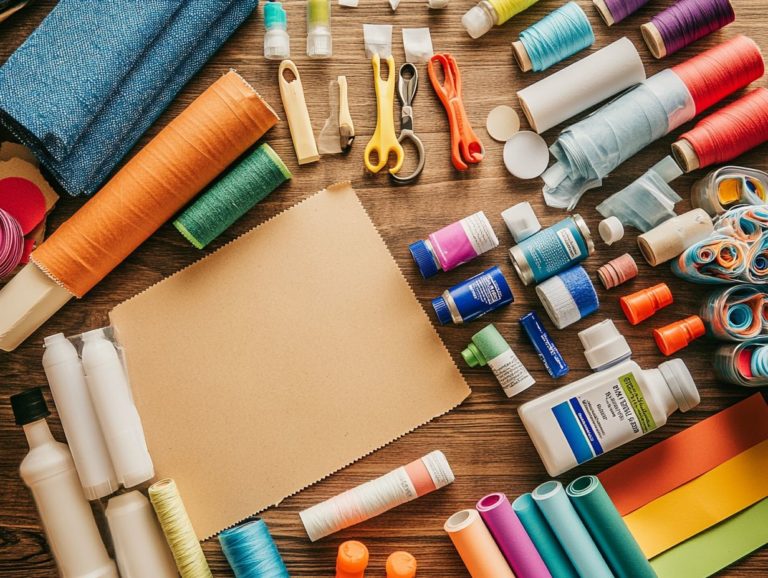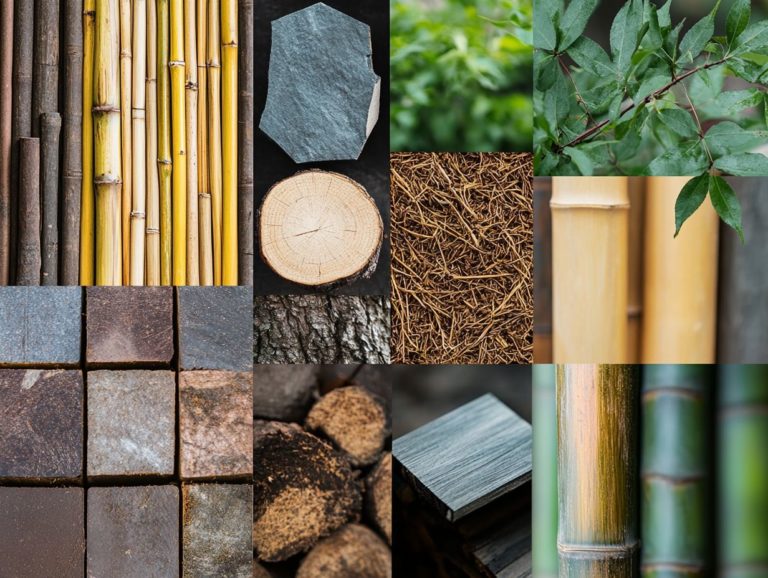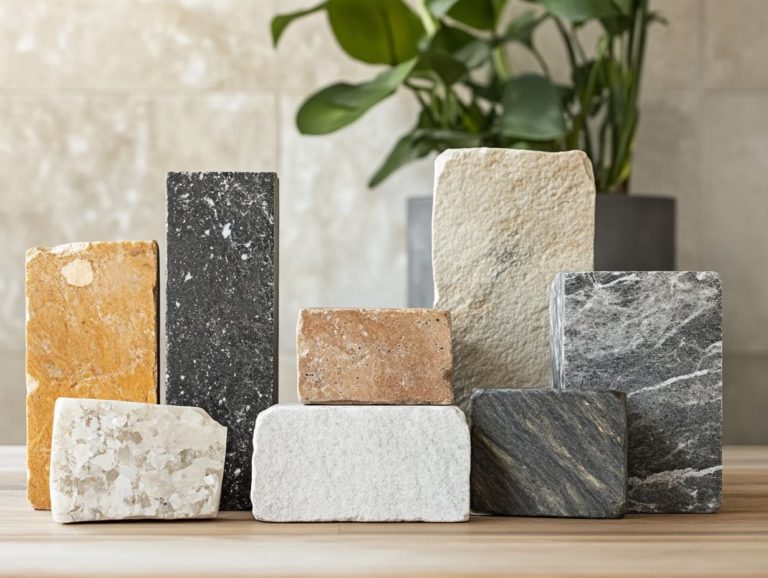5 Must-Have Eco-Friendly Kitchen Materials
In today’s world, making sustainable choices in the kitchen has never been more crucial. With a plethora of eco-friendly materials at your disposal, you can effortlessly reduce your environmental impact while preparing and storing food.
Discover five must-have eco-friendly materials that will revolutionize your kitchen! From reusable silicone bags to bamboo utensils, each choice you make contributes to a greener lifestyle. This article highlights their benefits not just for the planet, but also for your health and your wallet.
Explore how these simple switches can transform your kitchen into a more sustainable haven!
Contents
- Key Takeaways:
- 1. Reusable Silicone Bags
- 2. Bamboo Utensils
- 3. Glass Food Storage Containers
- 4. Beeswax Wraps
- 5. Stainless Steel Straws
- Why Go Green in Your Kitchen?
- What Are the Environmental Benefits of Using Eco-Friendly Kitchen Materials?
- What Are the Health Benefits of Using Eco-Friendly Kitchen Materials?
- How Can Using Eco-Friendly Kitchen Materials Save Money in the Long Run?
- What Are Some Other Eco-Friendly Kitchen Materials to Consider?
- How Can One Transition to Using More Eco-Friendly Kitchen Materials?
- Frequently Asked Questions
Key Takeaways:
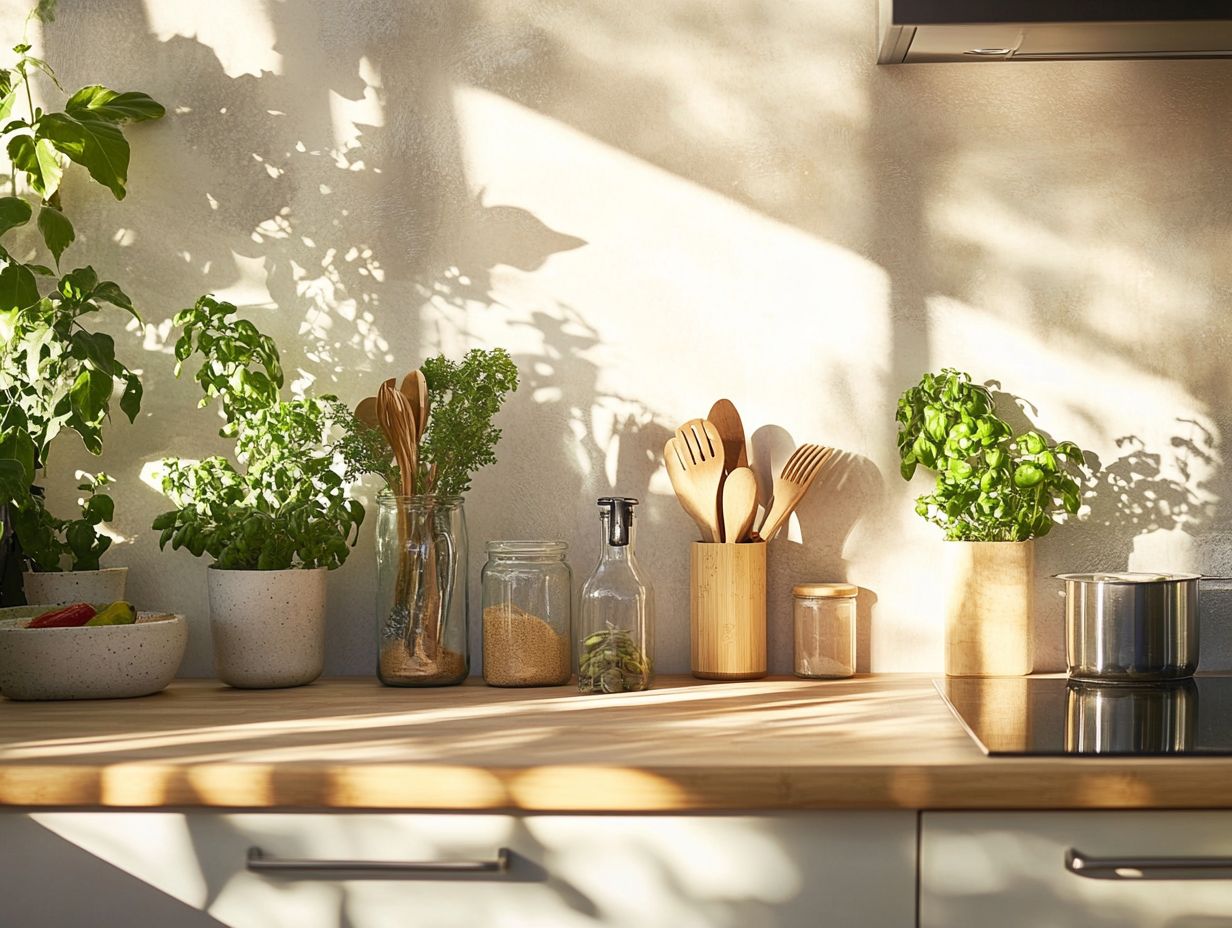
Reduce single-use plastic waste with reusable silicone bags!
Swap out plastic utensils for sustainable bamboo options that are both eco-friendly and stylish!
Upgrade to glass food storage containers for a healthier, more environmentally-friendly alternative to plastic containers!
1. Reusable Silicone Bags
Reusable silicone bags are an eco-friendly alternative to traditional plastic storage options that help reduce food waste while fostering sustainable practices in your kitchen.
These bags are incredibly versatile, accommodating everything from liquids to solids without the risk of leaking or tearing. They re also heat-resistant and microwave-safe, making reheating your meals during busy weekdays a breeze.
Brands like Stasher expertly blend practical design with a commitment to sustainability, leading the fight against plastic waste. By opting for these durable bags, you re extending the life of your leftovers and joining a movement dedicated to protecting our planet for future generations.
2. Bamboo Utensils
Bamboo utensils are a sustainable choice for eco-conscious consumers, offering a natural alternative that is biodegradable and non-toxic. This ensures your kitchen remains health-focused while minimizing your environmental impact.
These utensils are impressively durable, withstanding high temperatures and daily use without the splintering or bending that plagues plastic options.
Many brands acknowledge the shift toward sustainability, producing high-quality bamboo kitchenware. Companies like Bambu and Eco-Exist focus on durability and aesthetics while committing to eco-friendly practices throughout their supply chains.
By choosing bamboo over plastic, you re elevating your cooking experience and actively participating in a movement that champions sustainable living.
3. Glass Food Storage Containers
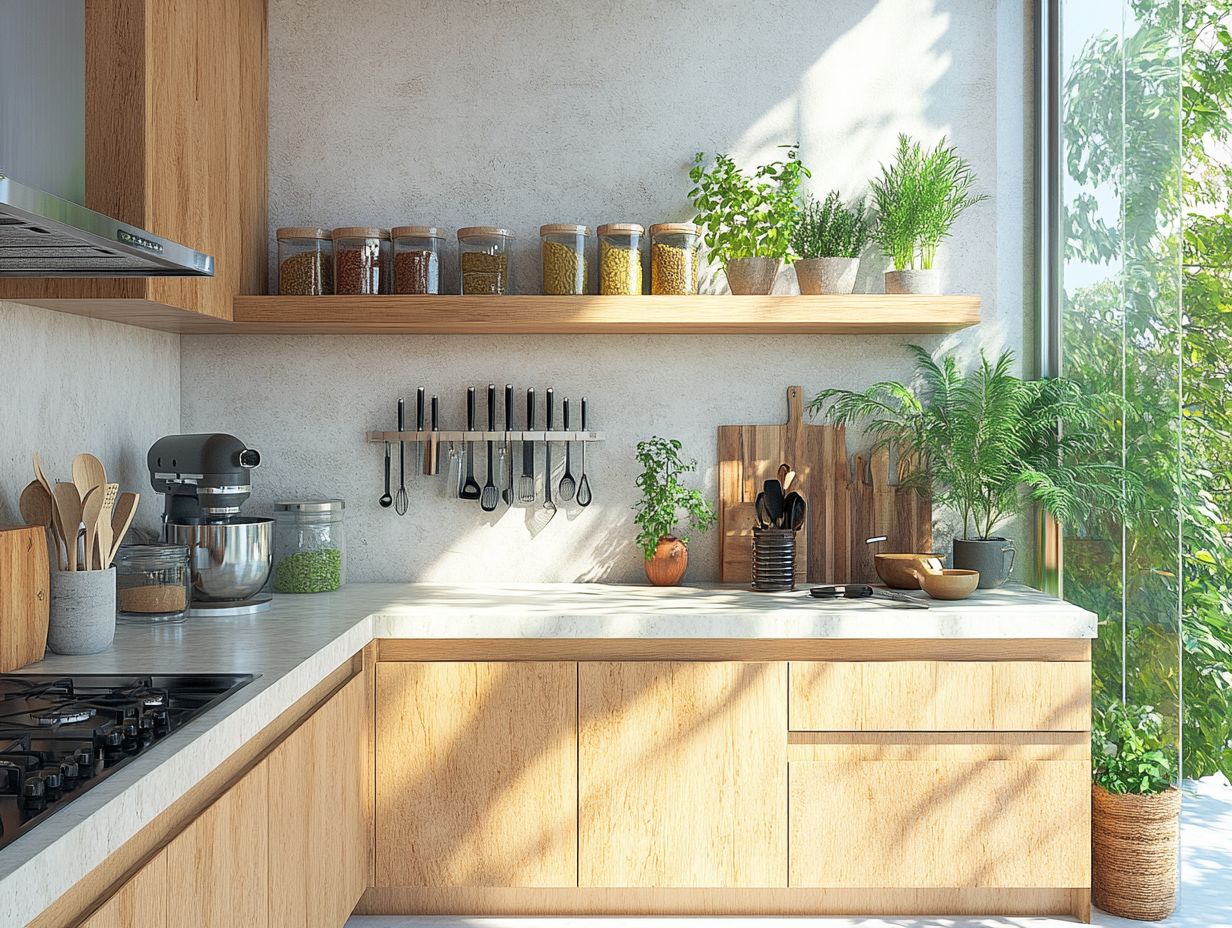
Glass food storage containers offer a reusable solution for meal prep and food preservation, making it easier to embrace healthier eating habits while minimizing reliance on single-use plastics.
Unlike plastic, these containers are crafted from non-toxic materials, ensuring that no harmful chemicals leach into your food. Renowned brands like Pyrex and Glasslock provide durable, high-quality options designed to withstand extreme temperatures and prevent spills or leaks.
Investing in glass storage solutions allows you to enjoy fresher meals while significantly reducing food waste, as these sturdy containers keep food quality intact for extended periods.
This conscious shift toward sustainable practices reflects a growing awareness of environmental responsibility and a desire for healthier living.
4. Beeswax Wraps
Beeswax wraps provide a sustainable and compostable way to cover your food. They serve as a versatile, eco-friendly alternative to plastic wrap, cutting down on waste while keeping your food fresh.
This innovative product is made from organic cotton mixed with beeswax, jojoba oil, and tree resin. The result is a breathable and pliable material that clings easily to various food items.
Unlike traditional plastic wraps that often end up in landfills, these wraps can be reused multiple times, making them economical and environmentally friendly.
Cleaning them is easy simply wash with cool water and mild soap. Avoid hot water to keep them in great shape!
Brands like Bees Wrap exemplify this sustainable approach by sourcing materials responsibly and ensuring their products are biodegradable.
Support your health and the planet today by making the switch to beeswax wraps!
5. Stainless Steel Straws
Stainless steel straws offer a sophisticated, eco-friendly alternative to disposable plastic straws. By choosing these reusable options, you not only prioritize your health, avoiding harmful chemicals, but also contribute significantly to sustainability.
When you opt for these durable straws, you’re helping combat the staggering plastic waste that burdens our planet. Each stainless steel straw can replace hundreds, or even thousands, of single-use plastic straws throughout its lifetime.
Brands like No Tox Life lead the charge, providing an impressive array of eco-conscious products tailored for environmentally aware consumers. These straws combine elegance with functionality, and they re easy to clean and maintain.
Make a meaningful impact on your health and the environment by switching to stainless steel straws today!
Why Go Green in Your Kitchen?
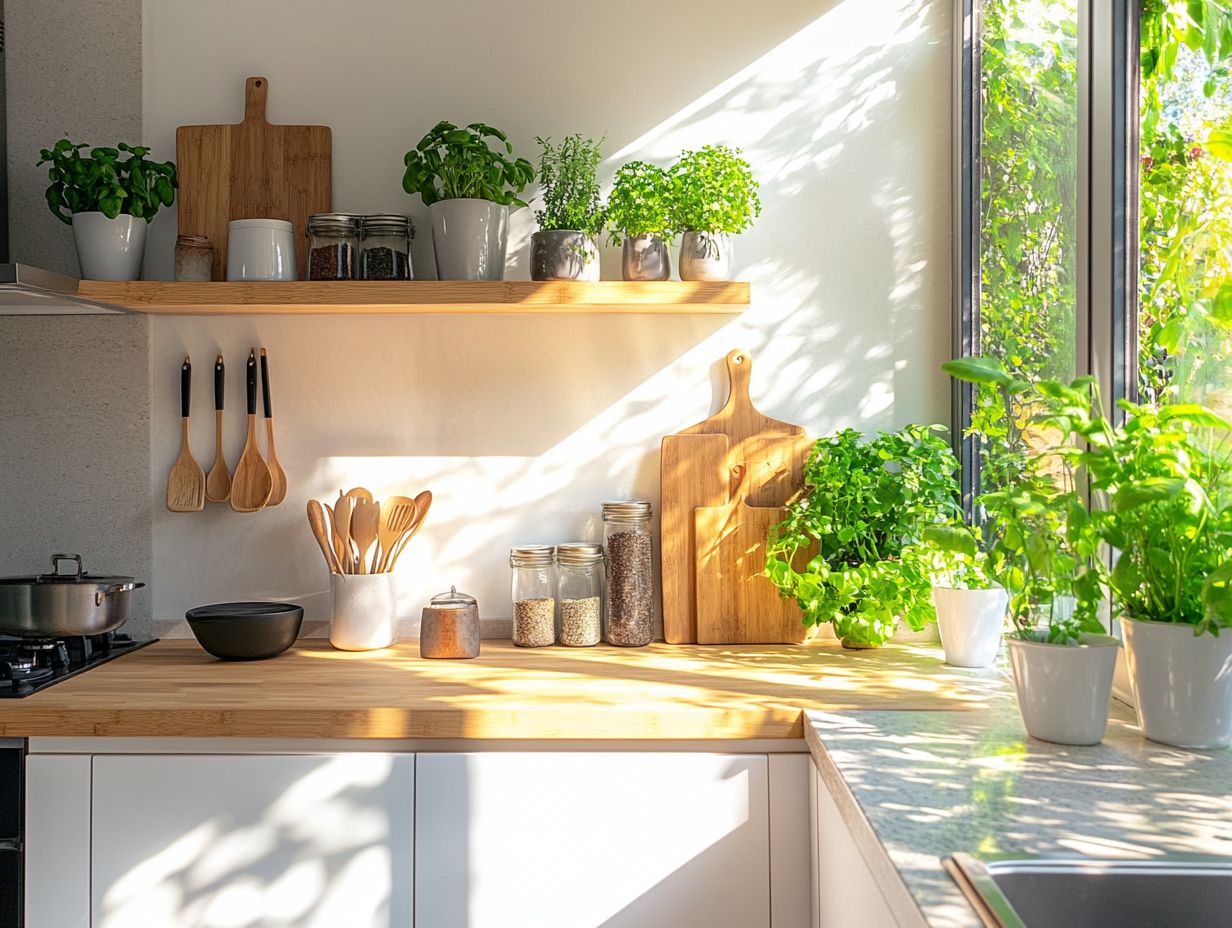
Using eco-friendly materials in your kitchen is vital for minimizing your environmental impact and promoting your family’s health. Sustainable products help reduce waste, enhance food safety, and create a healthier living space.
For instance, switching to bamboo utensils and cutting boards significantly lowers plastic waste since bamboo is a rapidly renewable resource. Recent studies show that using such materials can cut your overall kitchen waste by up to 50%.
Choosing glass storage containers over plastic not only protects your food from harmful chemicals but also contributes to safer meal preparation. Incorporating products made from recycled steel or natural fibers supports a cleaner environment while enjoying the aesthetic benefits of sustainable design.
These choices reflect your commitment to preserving the planet and foster a healthier lifestyle for everyone at home.
What Are the Environmental Benefits of Using Eco-Friendly Kitchen Materials?
The environmental benefits of choosing eco-friendly kitchen materials are significant. By making this switch, you contribute to waste reduction, promote recycling, and minimize the carbon footprint often linked to traditional plastic products.
Opting for items crafted from biodegradable materials like bamboo, glass, or stainless steel can dramatically reduce landfill waste. For example, bamboo utensils decompose naturally and grow rapidly, making them a sustainable choice.
Using glass containers instead of single-use plastics helps lower pollution levels since glass can be endlessly recycled without losing quality. These alternatives embody a lifecycle approach to sustainability.
Each product is designed to responsibly return to the earth or be repurposed, fostering a healthier environment for future generations. Make the switch to eco-friendly materials in your kitchen today!
What Are the Health Benefits of Using Eco-Friendly Kitchen Materials?
Choosing eco-friendly kitchen materials champions sustainable practices and brings numerous health benefits. These materials are often free from harmful chemicals found in conventional products, ensuring safer food storage and preparation.
Research shows that many traditional kitchen items, like plastic containers and non-stick cookware, can leach toxins into your food, potentially leading to health issues over time. By opting for organic textiles, bamboo utensils, and glass storage solutions, you can significantly reduce your exposure to these harmful substances.
Embracing natural materials encourages healthier eating habits. You ll likely feel inspired to prepare fresh, whole foods instead of relying on processed options. This mindful approach enhances your nutrition and fosters a deeper connection to your food and sustainability principles.
How Can Using Eco-Friendly Kitchen Materials Save Money in the Long Run?
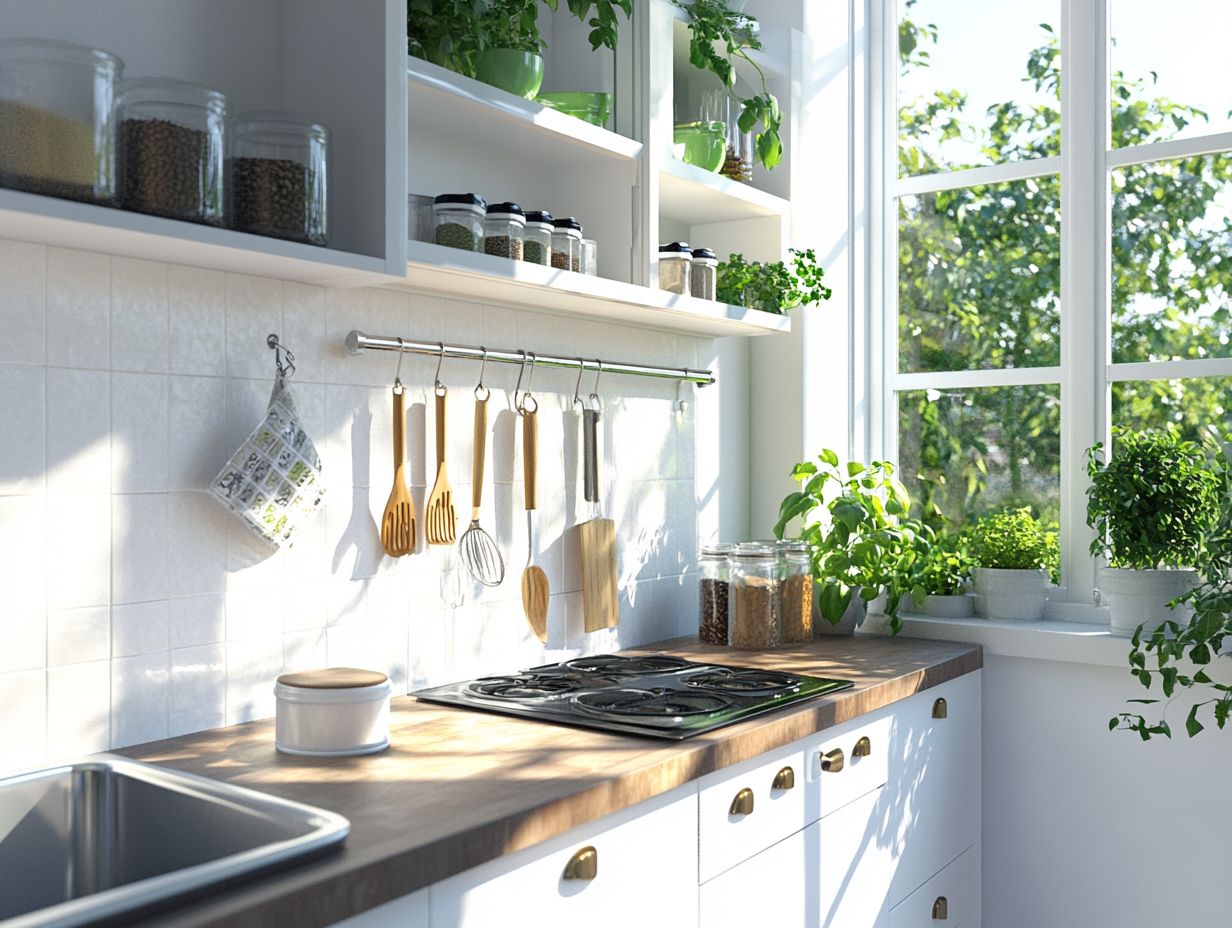
Adopting eco-friendly kitchen materials can lead to substantial savings over time. By choosing reusable products, you eliminate the need for constant repurchases of disposable items, effectively lowering what you spend at home while supporting sustainability.
For instance, consider swapping single-use plastic wrap for reusable beeswax wraps or trading paper towels for washable dishcloths. You ll be amazed at how these small changes can lead to big savings over the years.
While the initial investment in durable items may be higher, they typically outlast countless disposables. Investing in high-quality, reusable containers cuts down on frequent trips to the store for replenishments, saving you both time and money.
Ultimately, transitioning to reusable kitchen products supports your financial well-being and contributes to a healthier planet.
What Are Some Other Eco-Friendly Kitchen Materials to Consider?
Beyond reusable silicone bags and bamboo utensils, many eco-friendly kitchen materials deserve your attention:
- Ceramic cookware
- Compostable plates
- Organic kitchen textiles
These alternatives serve practical purposes and deliver significant environmental benefits, making them perfect choices for any eco-conscious cook.
Ceramic cookware excels at heat distribution and avoids harmful chemicals often found in traditional non-stick surfaces. By choosing compostable plates for gatherings, you can make a real impact on reducing landfill waste.
Meanwhile, organic textiles help create a healthier living space by eliminating synthetic dyes. Swapping plastic storage containers for glass can also prevent toxins from leaching into your food, paving the way for a greener kitchen that prioritizes your health and sustainability.
Now is the perfect time to make the switch to eco-friendly kitchen materials for a healthier you and a healthier planet! Start your journey to a greener kitchen today!
How Can One Transition to Using More Eco-Friendly Kitchen Materials?
Transitioning to eco-friendly kitchen materials requires a thoughtful approach. Begin by gradually swapping out regular kitchen items for sustainable alternatives while educating yourself about the benefits of a greener lifestyle.
Create a structured plan to make the transition easier. This way, the process feels manageable rather than overwhelming. Start by prioritizing reusable products, like cloth napkins and containers, which can significantly reduce waste over time.
Seek out reputable eco-friendly brands that offer a variety of sustainable options, from biodegradable utensils to non-toxic cookware. Every small change you make can create a big difference! Let s dive into how you can start today!
Frequently Asked Questions
- What are the 5 must-have eco-friendly kitchen materials?
The 5 must-have eco-friendly kitchen materials are:
- Bamboo utensils
- Reusable silicone food bags
- Glass food storage containers
- Compostable cleaning products
- Recycled paper towels
- Why are bamboo utensils considered an eco-friendly material for the kitchen?
Bamboo is a sustainable and renewable material that grows quickly and does not require pesticides or fertilizers. It is also biodegradable, meaning it can naturally break down without harming the environment, and compostable, making it a great alternative to plastic utensils. - How do reusable silicone food bags help reduce waste in the kitchen?
Reusable silicone food bags are a great alternative to single-use plastic bags, which can take hundreds of years to decompose. They can be washed and reused multiple times, significantly reducing the waste produced in the kitchen. - Are glass food storage containers better for the environment than plastic containers?
Yes, glass food storage containers are considered more eco-friendly than plastic ones. They are more durable, can be reused longer, and do not contain harmful chemicals like BPA. - How do compostable cleaning products benefit the environment?
Compostable cleaning products are made from natural and biodegradable materials, which means they break down into non-toxic substances and can be safely composted. This reduces the amount of harmful chemicals and plastic waste that end up in landfills and oceans. - What makes recycled paper towels a must-have eco-friendly material for the kitchen?
Recycled paper towels are made from previously used and recycled paper fibers, reducing the need for new trees to be cut down. They also use less energy and water in their production, making them a more environmentally friendly option compared to conventional paper towels.
Start making these changes today and contribute to a healthier planet!

